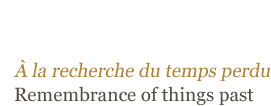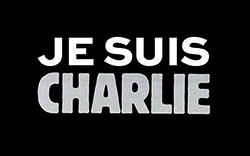


Academic Resources
Proust and His World
Course Description
Proust and His World
Marcel Proust (1871-1922) lived during one of the most turbulent, creative, productive, and tragic eras in European history. Born just after the Franco-Prussian war and the subsequent uprising and repression of the Paris Commune, he came of age during a time of post-conflict peace and creativity, known as the “belle époque.” His most creative years coincided with the massive tragedy of the First World War, which effectively ended that era and the society Proust had known. Recognition of his monumental creative contribution to world literature began to come only shortly before his death. He was deeply interested in, and engaged with, social and political affairs, especially the Dreyfus case and World War One – events which took place, it should be remembered, during nearly fifteen years of his short life. He was immensely interested in art and architecture, both ancient (especially gothic cathedrals) and modern (as in the paintings of Matisse and Whistler). He was spiritually engaged with music, and deeply knowledgeable about the works of Wagner , Chopin and Beethoven, in addition to the evolving work of his contemporaries – among them Faure, Saint -Saëns, Debussy, Cesar Frank, and Stravinsky. And, of course, Proust devoured the printed word, from the many newspapers he read daily, to the abundant literary journals of his time, and the creative compositions of dozens of poets and novelists.
The “Proust and His World” class is designed to explore the political, cultural, and artistic period when Proust lived. In doing so, the hope is that those who read some or all of In Search of Lost Time, as well as Proust’s voluminous other writings, will be better able to understand just what made (and makes) Proust unique.
Course Readings
Week One: Proust and His Era – An Overview- Gamble, Cynthia. “From Belle Epoque to First World War: The Social Panorama.” The Cambridge Companion to Proust. Cambridge: Cambridge UP, 2007.
- Hussey, Andrew. “Red Lightning.” Paris: The Secret History. New York: Bloomsbury, 2006.
- "Paris Commune.” Wikipedia entry, 2009.
- Jonnes, Jill. “We Meet Our Characters.” Eiffel’s Tower. New York: Viking, 2009.
- Gopnik, Adam. “Trial of the Century.” The New Yorker, 28 Sept. 2009.
- Begley, Louis. “The Past is Never Dead.” Why The Dreyfus Affair Matters. New Haven: Yale UP, 2009.
- Cambor, Kate. “Degradation.” Gilded Youth: Three Lives in France’s Belle Epoque. New York: Farrar, Straus & Giroux, 2009.
- Zola, Emile. “A Plea for the Jews” and “Justice.” The Dreyfus Affair and Other Writings. New Haven: Yale UP, 1998.
- Bloom, Harold. “Marcel Proust: In Search of Lost Time.” How to Read and Why. New York: Simon and Schuster, 2000.
- Smiley, Jane. “Marcel Proust.” Thirteen Ways of Looking at the Novel. New York: Knopf, 2005.
- Shattuck, Roger. “How to Read a Roman-Fleuve.” Proust’s Way. New York: W.W. Norton, 2000.
- Shapiro, Gary. “Remembrance of Things Proust.” New York Sun, 5 Nov. 2004.
- Greer, Germaine. “Why Do People Gush Over Proust?” The Guardian, 8 Nov. 2009.
- Proust, Marcel. Selections from Swann’s Way. Trans. Lydia Davis. New York: Penguin, 2002.
- Karpeles, Eric. “My Book is a Painting.” Paintings in Proust. London: Thames and Hudson, 2008.
- Munhall, Edgar. “The Salon of 1894 and Beyond” by Edgar Munhall. Whistler and Montesquiou: The Butterfly and the Bat. Paris: Flammarion, 1995.
- Charle, Christophe. “Debussy in Fin de Siècle Paris.” Debussy and His World. Ed. Jane F. Fulcher. Princeton: Princeton UP, 2001.
- Tadié, Jean-Yves. “Literary Friends.” Marcel Proust: A Life. Trans. Euan Cameron. New York: Viking, 2000.
- Dallas, Gregor. “Opera.” Metro Stop Paris: An Underground History of the City of Light. New York: Walker, 2008.
- Proust, Marcel. Selections from Cities of the Plain. Trans. C. K. Scott-Moncrieff. New York: Random House, 1981.
- Tadié, Jean-Yves. Selections from Marcel Proust: A Life. Ibid.
- Willmott, H. P. “Stalemate and Slaughter.” World War I. London: DK Publishing, 2007.
- Proust, Marcel. Selections from Finding Time Again. Trans. Ian Patterson. London: Penguin, 2003.
- Proust, Marcel. Selections from Finding Time Again. Ibid.
- Wilson, Edmund. Selections from Axel’s Castle. New York: Scribner’s, 1931.
- Rose, Phyllis. “An Unwritten Novel.” The Year of Reading Proust: A Memoir in Real Time. New York: Counterpoint, 1997.
- Proust, Marcel. “La Confession d’une jeune fille.” Contes Modernes. Introd. Henri Peyre. New York: Harper, 1949.